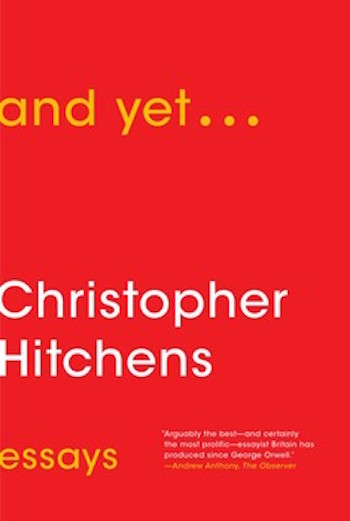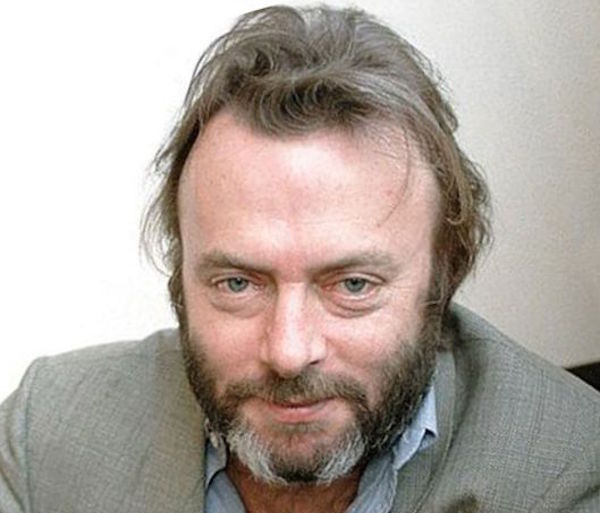Book Review: Christopher Hitchens — Final Stings From the Gadfly
The fact that some of these pieces could have been written yesterday says more for the eternal recurrence of the moronic inferno of political life than for Hitchens as a social prophet.
And Yet … by Christopher Hitchens. Simon & Schuster, 339 pages, $30.
By Matt Hanson

Of all the sins the late Christopher Hitchens could be accused of, no one could accuse him of sloth. After Arguably, his doorstopper of a collection of reviews, essays, and op-eds and the last book published before his well-publicized death, came Mortality, a slim collection of essays detailing his struggle with stage-four cancer, written literally from his deathbed. And now there is the oddly titled And Yet…, which gathers the remaining Hitchenalia in what will most likely be the final volume of his collected criticism.
And Yet… is heavy on the more personal side of Hitchens’s writing. It’s chock-full of literary criticism, including some of the writers Hitch revered most: George Orwell (of course), Evelyn Waugh, Dickens, Mikhail Lermontov, Orhan Pamuk, V.S. Naipaul, and his friend and literary comrade Salman Rushdie. With some exceptions, Hitchens takes up each writer with the same contrarian spirit and exacting analysis he brought to his journalism. Even if he clearly admires a writer he’s chomping at the bit to take them to task.
For one example, the saintly reputation of Che Guavera gets a thorough and disappointed debunking. Waugh is given due respect as a prose stylist and wit but Hitch the militant atheist has little patience for Waugh’s fanatical Catholicism and snobby imperialism. Orhan Pamuk’s widely acclaimed novel Snow gets a bracingly mixed review, with the occasional critical uppercut added in for good measure: “Paumk’s literalism and pedantry are probably his greatest enemies as a writer of fiction; he doesn’t trust the reader until he has hit him over the head with dialogue and explanation of the more didactic kind.”
It’s not widely known these days, but Orwell’s name is still mud in some quarters to this day because of an old accusation that he once helped to blacklist some ostensibly Stalinized intellectuals to the British government. Hitchens gives these claims a thorough going-over, ruling justly in favor of the defense. Paul Scott’s Raj Quartet novel series is praised for the way in which it shows how the forces of xenophobia and sexuality collided in British imperial policy. Edmund Wilson is given his proper due as an old-school man of letters, especially for being someone who uses his erudition and lucid prose style to encourage the lay reader to finally dive into Finnegans Wake.
And Yet…shows how Hitchens’s enviable productivity and literary energy were intact up to the end. Even in his final months, Hitch still managed a heartfelt tribute to Joan Didion’s mournful Blue Nights and to pen an impressively long and detailed appreciation of the work and life of G.K. Chesterton.
Some of the longer pieces here are travelogues, including a red state road trip where Hitch observes a NASCAR rally and, evidently out of sheer masochism, takes in a Creationist exhibit in Jefferson’s Virginia, which irks his secular patriotism to no end: ”These were men who actually founded the secular United States, but on Jefferson’s home turf the pious believers now sell bubble gum and crappy souvenirs, and credit divine authority for an accidental rock formation.”

Christopher Hitchens — his enviable productivity and literary energy were intact up to the end. Photo: Wiki.
However much Hitch wrote about the world of books or the world itself, in many ways he couldn’t resist being the center of attention. Vanity Fair made a three-part series out of subjecting the famously dissolute Hitch to a beautifying regimen that meant he not only had to lay off the booze and endless cigarettes but also get a Brazilian wax. Hitch takes the whole experience in self-deprecating good humor, but there’s only so much you can read about seaweed wraps and exercise bikes until you’re ready to see what else there is for the Hitch to sound off on. And of course he does, a few pages later there are some amusingly cranky dissents on Thanksgiving and Christmas, the latter described as “like living for four weeks in the atmosphere of a one-party state.”
Readers who didn’t share in the Hitch’s quixotic enthusiasm for the Iraq War may sigh with relief: aside from a few blustering salvos, there isn’t much political material here, but what there is still rings a bell. The contents of this collection, mostly written for The Atlantic, Slate, and Vanity Fair are arranged in a loose chronology, giving equal space to issues that are still relevant, such as the real meaning of Hillary Clinton’s vaunted “experience” in statecraft.
The fact that some of these pieces could have been written yesterday says more for the eternal recurrence of the moronic inferno of political life than for Hitch as a social prophet. As an immigrant who made his home in America for decades, Hitch stoutly defends his right to call America home after being rhetorically sucker-punched on a talk show by a “strenuously nativist and isolationist Pat Buchanan, [who] still strikes me, as he always did, as chronically un-American.” It makes one wonder what kind of response Hitch might have had to the rise of Donald Trump.
Or maybe not: towards the end of the book Hitch weighs in on the rise of the Tea Party and has a few choice words to say about the meaning of populist demagoguery: “How many times can you stand in front of an audience and state ‘I will always put the people of X first’?…This is to say no more than that you will be a megaphone for sectional interests and regional mood swings and that, to you, all politics is yokel.” Given the state of our current politics, And Yet… proves that Hitchens’s eloquently irascible voice is still very much needed.
Matt Hanson is a critic for The Arts Fuse living outside Boston. His writing has appeared in The Millions, 3QuarksDaily, and Flak Magazine (RIP), where he was a staff writer. He blogs about movies and culture for LoveMoneyClothes. His poetry chapbook was published by Rhinologic Press.
